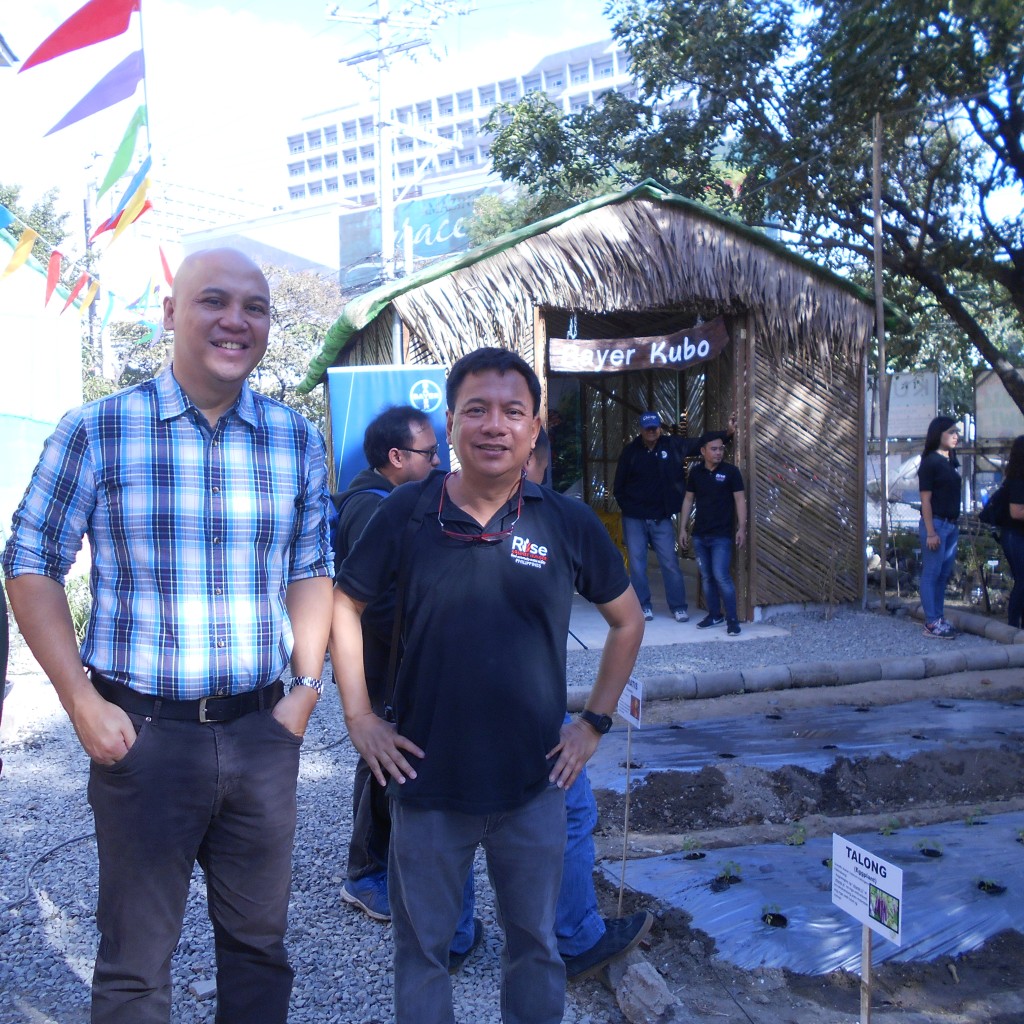
Bayer Kubo Launch: Bryan Rivera, Bayer Philippines and Jomar Flores, Rise Against Hunger

Bayer Kubo Launch: Bryan Rivera, Bayer Philippines and Jomar Flores, Rise Against Hunger
January 24, 2020
A first-of-its-kind urban farm has been put up in Taguig City by Germany-based Bayer as a showcase of a sustainable farm that has a captured market in Hilton hotel chain Conrad Manila.
At a launch in Pamayanang Diego Silang in Brgy. Ususan Taguig, the 200 square meter urban garden called “Bayer Kubo” aims to be part of contributing to meeting certain United Nations goals. The site is nearly along expressway C-5.
A major one under the Sustainable Development Goals of the United Nations is “zero hunger.”
Vinit Jindal, Bayer Philippines Inc managing director, said the urban garden in Taguig City contributes to this goal and, depending on the availability of suitable land and other partners, the Bayer Kubo concept may be replicated in other urban areas “where it will have significant positive impact.”
“With the Philippines’ growing population, urban agriculture will be important in food security,” said Jindal.
Conrad Manila General Manager Laurent Boisdron said the hotel traditionally sources its supply of vegetables and herbs from the local market.
“We will now buy our vegetables from this farm. Yes we know the produce will be of high-quality with this partnership with Bayer and the community,” said Boisdron in the same launch Thursday.

The project’s memorandum of agreement also includes Taguig local government unit (LGU) and civic group Rise Against Hunger.
Jomar Flores, Rise Against Hunger executive director, said some urban farms are just launched and later on abandoned. But two major factors will contribute to sustainability of Bayer Kubo.
Direct participation from the Pamayanang Diego Silang and the presence of a direct market in Conrad Manila are major factors to sustainability, said Flores. The BCDA housing community has 2,800 units with 62 buildings.
“We put up our first Food Bank (food storage centers for free distribution to urban poor) in Taguig City. Food banks will only succeed if it’s in an urban area, not rural. The food manufacturers are there (as food supply sponsors),” said Flores.
While it is difficult to organize scattered people in the boondocks, urban areas have the human density, the urban poor consumers, who need food and jobs.
Rise Against Hunger has 12 day care centers in Taguig City where it regularly feeds children and has 500 member-families in its food bank.
Bayer is supplying all the needs of the urban farm—seeds, technical-agronomic assistance, training of people in financial-business operation.
Earwin A. Belen, licensed agriculturist of Rise Against Hunger, said the Bayer Kubo program is using organic practices in the vegetable and herbs farm.
“We’re using organic practices. We use vermicast as fertilizer from worm (waste). We are training the resident-farmers on how to grow vegetables together with the DA (Department of Agriculture,” said Belen.
Bayer Kubo program will also train the 30 registered volunteers from Pamayanang Diego Silang on preparing organic concoctions, fermented fruit juice as plant growth enhancers.
The aquaponics system that Bayer Kubo program is using is also efficient in both fish and vegetable production. It uses a one cubic meter tank to grow lettuce producing 75 heads per cycle (5-6) weeks.
The vegetables are supplied with nutrient by the waste of the fish from the same tank that can grow 30 kilos of tilapia at a time.
Vegetables and herbs now planted in the Bayer Kubo facility here are eggplant, tomato, pepper, medicinal plants roselle, taheebo, gotu kola, tarragon, gotu kola, serpentine, basil, lemongrass, and Thai garden tea.
Registered farmer-volunteers in the urban farm are 30 Pamayanang Diego Silang residents in medium-rise building community in BCDA Housing, mostly senior citizens or retirees.
A multi-sectoral partnership supports success of the program even as Taguig City itself has long been known to sustain its large tracts of profitable farm land despite urbanization.
“We have large tracks of land– hundreds of hectares for farm that have long been farm areas. We have a big production of melon in Taguig. We have kept our rice farms,” said Felix Catigay Taguig City environment officer.
Taguig City naturally has urban greenery program—containerized fruit-bearing trees and urban gardens – in idle areas identified by the city assessor’s office.
What makes the program more holistic is Bayer is making Bayer Kubo, particularly referring to a sawali-bamboo structure conference center, an urban poor multi-program center.
The consumer health and pharmaceutical divisions of Bayer Philippines is also supplying medicines, contraceptives and related products to the community that will support health and population control here.
It will provide training on family planning where Bayer has long involved in successful community work even in other countries where it operates. (Melody Mendoza Aguiba)
PHOTO
Bayer Philippines Managing Director Vinit Jindal at the Bayer Kubo with the high-rise buildings behind rising C-5 expressway, Taguig City